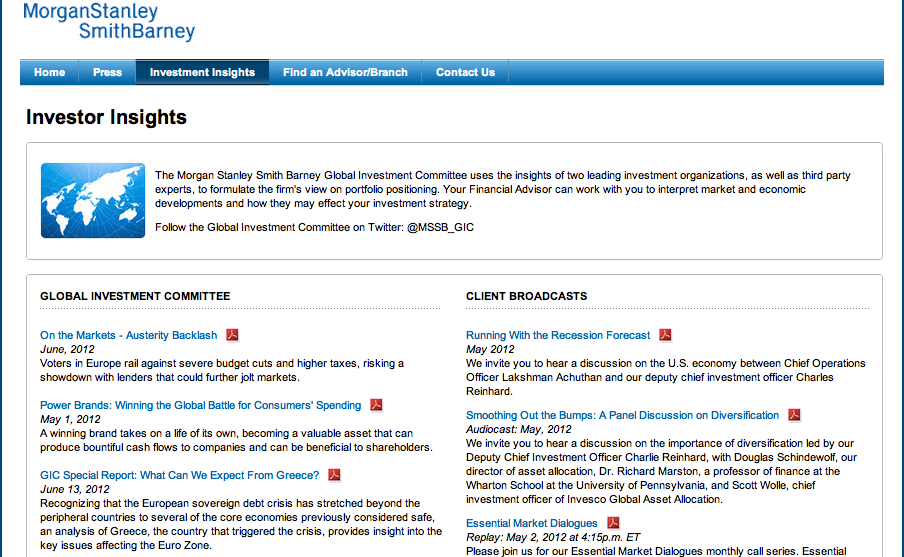

Hodgman, Associate Director in the SEC’s Division of Enforcement. “Investment advisers are obligated to fully inform their clients about the fees that clients will pay in exchange for services,” said Melissa R. As a result of MSSB’s conduct, the order finds that certain MSSB clients were unable to assess the value of the services received in exchange for the wrap fee paid to MSSB. During that period, however, the order finds that some MSSB managers routinely directed wrap fee clients’ trades to third-party broker-dealers for execution, which in some instances resulted in MSSB clients paying additional transaction fees that were not visible to them. From at least October 2012 until June 2017, some of MSSB’s marketing and client communications gave the impression that wrap fee clients were not likely to incur additional trade execution costs.

Morgan stanley smith barney barrington professional#
According to the SEC’s order, MSSB marketed its wrap fee accounts as offering clients professional investment advice, trade execution, and other services within a “transparent” fee structure. Wrap fee programs offer accounts in which clients pay an asset-based “wrap fee” that covers investment advice and brokerage services, including trade execution. MSSB has agreed to pay a $5 million penalty that will be distributed to harmed investors.

The investment banking firm - no stranger to data breaches - admitted that attackers stole personal information of its customers by hacking into an Accellion server of a third-party vendor, which it uses for file-sharing and transfers.The Securities and Exchange Commission today announced that Morgan Stanley Smith Barney LLC (MSSB) has agreed to settle charges that it provided misleading information to clients in its retail wrap fee programs regarding trade execution services and transaction costs. News of the SEC’s fine comes after Morgan Stanley was caught up in a data breach last year as a result of the Accellion hack. “We have previously notified applicable clients regarding these matters, which occurred several years ago and have not detected any unauthorized access to, or misuse of, personal client information,” said Susan Siering, a spokesperson for Morgan Stanley. In a statement given to TechCrunch, Morgan Stanley didn’t admit or deny the findings but said it is “pleased to be resolving this matter.” Today’s action sends a clear message to financial institutions that they must take seriously their obligation to safeguard such data.” “If not properly safeguarded, this sensitive information can end up in the wrong hands and have disastrous consequences for investors. Grewal, director of the SEC’s Enforcement Division. Customers entrust their personal information to financial professionals with the understanding and expectation that it will be protected, and MSSB fell woefully short in doing so,” said Gurbir S. “MSSB’s failures in this case are astonishing.

The regulator added that, during this process, MSSB learned that the local devices being decommissioned had been equipped with encryption capability but had failed to activate the encryption software. The SEC also alleged that Morgan Stanley lost track of 42 servers that potentially contained unencrypted customer data when it decommissioned local office and branch servers as part of a hardware refresh program. “While MSSB recovered some of the devices, which were shown to contain thousands of pieces of unencrypted customer data, the firm has not recovered the vast majority of the devices,” the SEC said in a statement. Some of the hard drives were later found on an internet auction site with customers’ personal data still stored within. Morgan Stanley hired a moving and storage company with “no experience or expertise in data destruction services,” according to the SEC and failed to properly monitor the moving company’s work. MSSB, now known as Morgan Stanley Wealth Management, is the wealth and asset management division of banking giant Morgan Stanley, which this week agreed to pay $35 million to settle allegations that it failed to properly dispose of hard drives and servers containing its customers’ personal data over a five-year period as far back as 2015. Securities and Exchange Commission has agreed to settle charges against Morgan Stanley Smith Barney (MSSB) for its “astonishing” failure to protect the personal identifying information of some 15 million customers.


 0 kommentar(er)
0 kommentar(er)
